
The Who are an English rock band formed in London in 1964. Their classic lineup consisted of lead singer Roger Daltrey, guitarist and singer Pete Townshend, bass guitarist and singer John Entwistle, and drummer Keith Moon. They are considered one of the most influential rock bands of the 20th century and have sold over 100 million records worldwide. Their contributions to rock music include the development of the Marshall stack, large PA systems, the use of the synthesizer, Entwistle and Moon's influential playing styles, Townshend's feedback and power chord guitar technique, and the development of the rock opera. They are cited as an influence by many hard rock, punk rock and mod bands, and their songs still receive regular exposure.

Quadrophenia is the sixth studio album by the English rock band the Who, released as a double album on 26 October 1973 by Track Records. It is the group's second rock opera. Set in London and Brighton in 1965, the story follows a young mod named Jimmy and his search for self-worth and importance. Quadrophenia is the only Who album entirely composed by Pete Townshend.
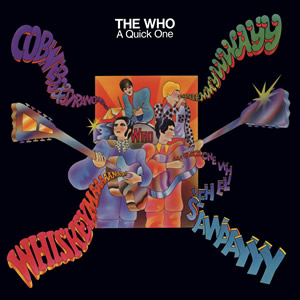
A Quick One is the second studio album by the English rock band the Who, released on 9 December 1966. A version of the album with an altered track listing was released under the name Happy Jack on Decca Records in April 1967 in the United States, where the song "Happy Jack" was a top 40 hit.

My Generation is the debut studio album by English rock band the Who, released on 3 December 1965 by Brunswick Records in the United Kingdom, and Festival Records in Australia. In the United States, it was released on 25 April 1966 by Decca Records as The Who Sings My Generation, with a different cover and a slightly altered track listing. Besides the members of the Who, being Roger Daltrey (vocals), Pete Townshend (guitar), John Entwistle (bass) and Keith Moon (drums), the album features contributions by session musicians Nicky Hopkins (piano) and Jimmy Page (guitar) and vocal group the Ivy League.
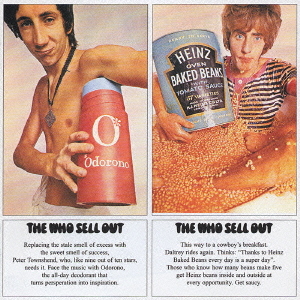
The Who Sell Out is the third studio album by the British rock band the Who. It was released on 15 December 1967 by Track Records in the UK and Decca Records in the US.
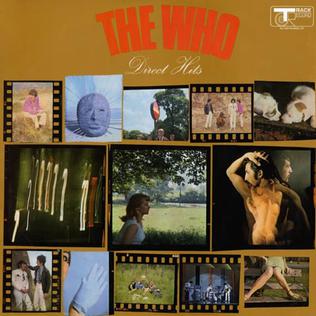
Direct Hits is the first UK compilation album released by The Who. It collects singles, B-sides, and album tracks originally recorded for Reaction Records and Track Records between 1966 and 1968. Original UK issues of this album were released in both stereo and mono versions. The album was not a strong seller and was deleted in the early 1970s. This was the fourth UK LP released by The Who.

Quadrophenia is a 1979 British drama film, loosely based on The Who's 1973 rock opera of the same name. It was directed by Franc Roddam in his feature directing début. Unlike the adaptation of Tommy, Quadrophenia is not a musical film, and the band does not appear live in the film.

Reaction Records was an independent British record label, run by music executive Robert Stigwood in 1966 and 1967. Although Reaction released only three albums, one EP and eighteen singles in its brief existence, its roster included two of the most popular British bands of the time, The Who and Cream.

Odds & Sods is an album that consists of studio outtakes and rarities by British rock band The Who released by Track Records in the UK and Track/MCA in the US in 1974. It is notable as being one of the first and earliest examples of "rarities" compilations.

"5:15" is a song written by Pete Townshend of British rock band The Who. Part of the band's second rock opera, Quadrophenia (1973), the song was also released as a single and reached No. 20 on the UK Singles Chart, while the 1979 re-release reached No. 45 on the Billboard Hot 100.
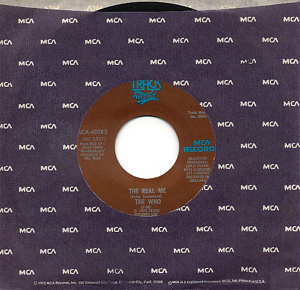
"The Real Me" is a song written by Pete Townshend on The Who's second full-scale rock opera, Quadrophenia in 1973. This is the second track on the album, although it is the first with lyrics. It concerns a boy named Jimmy, a young English Mod with four distinct personalities. The song describes how he angrily deals with several individuals to identify "the real me". The song was released as a single in the United States and Canada in 1974.

"Love, Reign o'er Me", subtitled "Pete's Theme", is a song by English rock band The Who. Written and composed by guitarist Pete Townshend, it was released on 27 October 1973 as the second single from the band's sixth studio album and second rock opera, Quadrophenia. It is the final song on the album, and has been a concert staple for years. The song peaked at number 76 on the US Billboard Hot 100 and number 54 on Cash Box.

My Generation: The Very Best of The Who is one of The Who's many greatest hits collections, released by Polydor Records internationally and MCA Records in the United States in 1996. Its release coincided with the release of the remastered original albums and thus contained the newly remastered versions of the songs, and some also remixed.
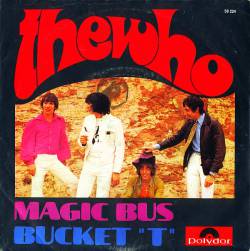
"Magic Bus" is a song recorded by British rock band the Who. It was written by their guitarist Pete Townshend during the time that their debut album My Generation was being recorded in 1965. However, it was not recorded until 1968, when it was released as a single on 27 July 1968 in North America, followed by its release in the United Kingdom on 18 September 1968. It has become one of the band's most popular songs and has been a concert staple, although when released, the record only reached number 26 in the UK and number 25 in the United States. The song was included on their 1968 album Magic Bus: The Who on Tour.
"I'm One" is a song by The Who. It was released on the group's 1973 rock opera album Quadrophenia. Written and sung by Pete Townshend, the song has since become a fan favorite.
Rock Is Dead—Long Live Rock was the title of an unreleased 1972 autobiographical album by the British rock band The Who. In the liner notes for the Who's 1974 rarities collection Odds & Sods, guitarist and lead songwriter Pete Townshend said, "I had an idea once for a new album about the history of The Who called Rock Is Dead—Long Live Rock. That idea later blossomed into Quadrophenia." The sessions for the album spanned from 19 May to 6 June at Olympic Studios in London. Rock Is Dead—Long Live Rock was to be produced by The Who and Glyn Johns and scheduled for release in October 1972, but although the album was nearly completed the band felt as though it sounded too much like their 1971 LP Who's Next. Townshend later stated that Rock Is Dead—Long Live Rock was also going to be a TV special about The Who.

"Dogs" is a UK single written by Pete Townshend and released by the Who in June 1968. It reached number 25 on the UK singles chart, lower than any single the band had released in several years. The B-side of the UK single was "Call Me Lightning". Both songs were originally released mixed in mono only, as they were not intended for album release.
"Had Enough" is a song written by the Who bassist John Entwistle, and featured on their eighth studio album, Who Are You. It was also released as a double A-sided single with "Who Are You", making it Entwistle's second single A-side, after "Postcard" from Odds & Sods in 1974.

Quadrophenia is the soundtrack album to the 1979 film Quadrophenia which refers to the 1973 rock opera Quadrophenia. It was initially released on Polydor Records in 1979 as a cassette and LP and was re-released as a compact disc in 1993 and 2001. The album was dedicated to Peter Meaden, a prominent Mod and first manager of The Who, who had died a year prior to the album's release.

Rarities Volume I & Volume II is a two-album series collecting songs by The Who, released in 1983 on Polydor in the United Kingdom.

















